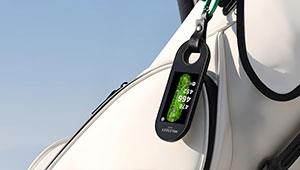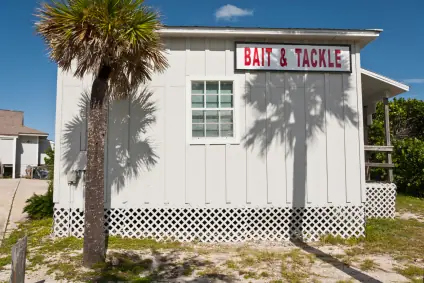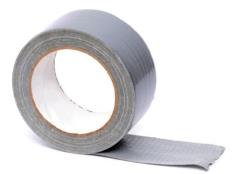Adhesives Help Keep Things Together
While glues can't mend a broken heart, they'll fix just about anything else and can save a situation that's going from bad to worse.
Adhesives are available for many specialized purposes. Here's what you'll want to add to your collection of RV tools:
- "Super" glue for high strength repairs.
- Vinyl adhesive for fixing tears in same-named fabrics.
- Threadlocker glue to prevent screws and bolts from vibrating loose.
- Multi-purpose adhesive for re-affixing door seals, loose trim and molding, and re-sticking peeling decals.
- Silicon sealant to keep the rain from creeping in.
- Seam sealer (for tents), for keeping the dew on the outside.
Another "sticky" item that can spare you from disaster is a small set of adhesive-backed hook-and-loop tabs. And don't forget that universal fix-it that's good for practically any repair: Duct Tape!
Hardware and Fasteners
When tape or glues just won't fix it, a "heck-bag" of assorted wood, machine and self-tapping screws, plus small bolts in a few sizes and lengths with matching nuts and washers can save you from uttering a few choice curse words when something substantial busts loose.
A bundle of plastic zip ties (removable and permanent) is also handy for cinching things together while out in the forest.
Toss in a couple of spare cabinet door catches too, to prevent your toiletries from flying all over the bathroom while traveling.
Let There Be Light
Nothing is more aggravating than your coach lights blinking off right at dinnertime. Or having a Highway Patrol officer wave you over because a brake light is out. That's why having a few select electrical items in your well-equipped trailer or RV toolbox can be unbelievably handy.
First and foremost is an assortment of fuses in various amperage ratings to replace blown fuses on your power converter/charger or power panel. A blown fuse is usually the result of pulling too much amperage on one circuit, or an electrical short; but sometimes they'll "pop" for no good reason. Be sure to replace a blown fuse only with the same size, never larger. A fuse that blows repeatedly is a good indication that you've got a short somewhere that must be repaired, otherwise the same problem will persist.
A collection of spare bulbs for brake, turn and running lights are also a must, and can save you from a traffic violation or worse. Make sure you have interior light bulbs as well.
A miniature voltmeter is helpful for tracing shorts and measuring battery voltages.
A small roll of 10- to 12-gauge insulated wire can help you bypass a problem area, and be sure to include a roll of electrical tape to prevent sparks or fuses from blowing.
A battery-operated or butane powered soldering iron and solder is helpful for making solid electrical repairs when you're out in the boondocks with no AC power.
And a nice option is a head-mounted flashlight, for working in the dark where you need both hands free.
If all else fails, a box of weatherproof safety matches is ideal. You can use them to light a fuel lantern or a properly prepared campfire to hold back the night. Use with caution; they burn like a firecracker fuse and you can't blow them out!
- 2
- of
- 3








Discuss This Article